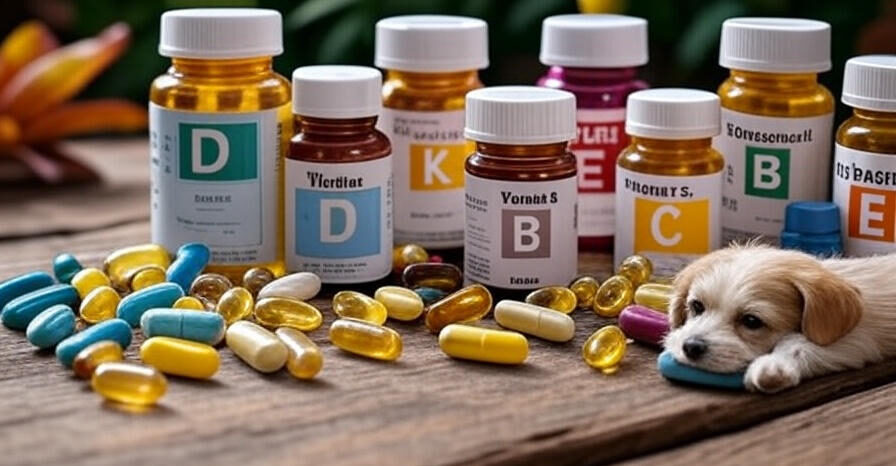Are you looking for the best 10 vitamins for your dog?
In this blog post, we’ll explore the best 10 vitamins for your dog? benefits of different vitamins and minerals, how to choose the right ones for your dog, and tips to ensure your furry friend gets all the nutrients they need. Here are the best vitamins for your best friend:

1. Vitamin A
This essential nutrient supports your dog’s growth and development. It’s found in animal products like fish oil, egg yolks, liver, and bone marrow. Make sure your dog gets enough vitamin A every day to help prevent skin problems and eye infections. A daily supplement can be helpful.
2. Vitamin D
Vitamin D is important for your dog’s health. It helps with calcium and phosphorus absorption, supports healthy bones and teeth, and aids muscle function. Dogs can’t make enough vitamin D on their own, so they need it from their diet. Supplements are the best source, but it can also be found in milk, egg yolk, and organ meats like liver and fatty fish.
3. Vitamin E
This fat-soluble vitamin supports your dog’s immune and nervous systems. It helps keep their skin and eyes healthy. Most dry dog foods contain vitamin E as d-alpha tocopheryl acetate, which is easily absorbed. Check the packaging or ingredients list for vitamin E content.
4. Vitamin K
Vitamin K helps keep your dog’s bones and teeth strong and supports normal blood clotting. It’s usually present in dog food as phylloquinone (K1), a synthetic form made from lupine beans. You can also find it in supplement form. The amount in dog food varies, but it’s an essential nutrient according to dog food standards.
5. Choline
Also known as betaine or trimethylglycine (TMG), choline is part of the B vitamin family. It helps produce acetylcholine, which is needed for muscle contraction and brain function. Choline is important for memory, learning, and fat metabolism in your dog.
6. Vitamin B
Thiamine (vitamin B) is essential for your dog’s nervous system and skeletal development. It helps produce acetylcholine and supports energy metabolism. Dogs that don’t get enough vitamin B may have poor growth, muscle weakness, and weight loss. It’s especially important for pregnant and nursing dogs and their puppies. Pet food usually contains vitamin B as riboflavin and niacinamide, in both milligram and microgram amounts.
7. Vitamin C
Also called ascorbic acid, vitamin C is an antioxidant that helps your dog’s immune system and tissue repair. It helps make collagen and other proteins for skin, bones, and connective tissue. Vitamin C also protects cells from damage and helps keep skin healthy.
8. Zinc
Zinc is an essential mineral for your dog’s immune system. It helps fight infections, make hormones and enzymes, and supports overall health. Deficiency is rare, but if your dog doesn’t eat enough zinc-rich foods, their immune system may weaken. Foods like beef and salmon are good sources.
9. Iron
Iron helps your dog form hemoglobin and red blood cells, which carry oxygen to muscles and tissues. It’s also important for energy production. Good sources of iron include beef, liver, and lamb. Without enough iron, your dog may struggle with these vital functions.
10. Selenium
Selenium is a trace mineral found in many foods. It helps make enzymes and hormones, supports the immune system, and may reduce the risk of cancer and heart disease. Selenium deficiency can cause health problems like impaired reproduction, cancer, and skin disorders. Foods like fish, liver, and chicken are good sources.

We hope you found this guide to the best vitamins for your dog helpful. If you have any questions or suggestions, feel free to leave a comment below. For more tips on dog health and nutrition, browse our other blog posts!
